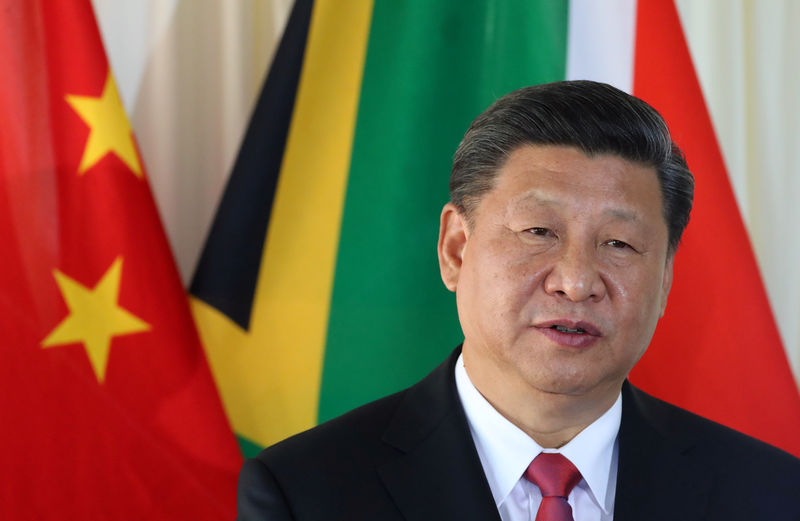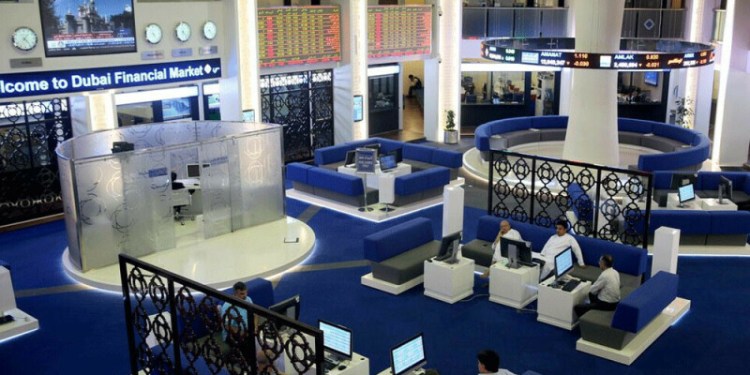 © Reuters. China’s President Xi Jinping addresses a media conference with South African President Cyril Ramaphosa in Pretoria
© Reuters. China’s President Xi Jinping addresses a media conference with South African President Cyril Ramaphosa in PretoriaBy Ben Blanchard and Kevin Yao
BEIJING (Reuters) – A growing trade war with the United States is causing rifts within China’s Communist Party, with some critics saying that an overly nationalistic Chinese stance may have hardened the U.S. position, according to four sources close to the government.
President Xi Jinping still has a firm grip on power, but an unusual surge of criticism about economic policy and how the government has handled the trade war has revealed rare cracks in the ruling Communist Party.
A backlash is being felt at the highest levels of the government, possibly hitting a close aide to Xi, his ideology chief and strategist Wang Huning, according to two sources familiar with discussions in leadership circles.
A prominent and influential academic whose views have found favor in some party quarters has also come under attack for his strident views on Chinese power.
Wang, who was the architect of the “China Dream”, Xi’s vision for China to become a strong and prosperous nation, has been taken to task by the Chinese leader for crafting an excessively nationalistic image for the country, which has only provoked the United States, the sources said.
“He’s in trouble for mishandling the propaganda and hyping up China too much,” said one of the sources, who has ties to China’s leadership and propaganda system.
The office of the party’s spokesman did not respond to a request for comment on Wang and his relationship with Xi, or on whether China had erred in its messaging in the trade war.
There is a growing feeling within the Chinese government that the outlook for China has “become grim”, according to a government policy advisor, following the deterioration in relations between China and the United States over trade. The advisor requested anonymity.
Those feelings are also shared by other influential voices.
“Many economists and intellectuals are upset about China’s trade war policies,” an academic at a Chinese policy think tank told Reuters, speaking on condition of anonymity due to the sensitivity of the issue. “The overarching view is that China’s current stance has been too hard-line and the leadership has clearly misjudged the situation.”
That view contrasts with the thinking at the beginning of the year of many Chinese academics who had touted China’s ability to withstand the trade row in the face of Trump’s perceived political weakness at home.
China thought it had reached a deal with Washington in May to avoid a trade war, but was shocked when the Trump administration, in Beijing’s eyes, went back on that agreement.
“The evolution from a trade conflict to trade war has made people rethink things,” the policy advisor said. “This is seen as being related to the exaggeration of China’s strength by some Chinese institutions and scholars that have influenced the U.S. perceptions and even domestic views.”
One official who is familiar with China’s propaganda efforts said the messaging had gone astray.
“In the trade war, the line of thinking in the propaganda has been that Trump is crazy,” said the official. “In fact, what he is scared of is us getting strong.”
CONFIDENT CHINA?
Under Xi, officials have become increasingly confident in proclaiming what they see as China’s rightful place as a world leader, casting off a long-held maxim of Deng Xiaoping, the former paramount leader who said the country needed to “bide its time and hide its strength”.
That confidence has been apparent as the government pushes its Belt and Road initiative to develop trade routes between East and West and takes a hard line on territorial issues such as the South China Sea and Taiwan.
Hu Angang, an economics professor at Tsinghua University and an expert in the field of “Chinese exceptionalism”, is one prominent advocate for the view that China has achieved “comprehensive national power”.
In recent weeks, Hu has faced a public backlash, with critics blaming him for making the United States wary of China by trumpeting and exaggerating its relative economic, technical and military might.
That view of Hu is also shared by some people in official circles, according to the policy advisor.
Hu declined to comment when contacted by Reuters.
The cracks within the party come as China’s stock markets and currency have slumped, and the government has struggled to shore up the economy to cushion the impact of the trade war.
China in recent weeks has encouraged more lending and pledged to use fiscal policy – including tax cuts and more funding for local governments – to combat slowing economic growth and rising uncertainty driven in part by the escalating trade war.
Xi has had other fires to hose too, including public anger over a vaccine fraud case and protests in Beijing this week by investors in failed online lending platforms.
Meanwhile, top leaders are believed to be meeting for secretive annual talks, most likely at the seaside resort of Beidaihe, leaving a policy vacuum as Xi and other officials all but vanish from state media. Based on what has happened in previous years, that could be for up to two weeks.
It is unclear if Wang, the propaganda boss, will face any consequences, and there may be other reasons for the tensions within the party related to him.
A third source with ties to the leadership told Reuters the tension had to do with Wang opposing a cult of personality that has been forming around Xi.
Wang still features in state media and diplomats and leadership sources say he is unlikely to be removed from the Standing Committee, the party body that runs China, in what would be an unprecedented move.
Though official media has in recent days been filled with defiant commentary regarding the United States and the trade war, there have been signs of a shift in China’s messaging.
Beijing has begun downplaying Made in China 2025, the state-backed industrial policy that is core to Washington’s complaints about the country’s technological ambitions.
State television’s English-language news channel CGTN, which is aimed at foreigners, has also been focusing on how ordinary Americans will be affected by more expensive prices for cheap made-in-China consumer goods and the damage tariffs will do to the U.S. economy.
But the thinking in Chinese government circles is that the damage has already been done – and that China has learned the hard way that its domestic propaganda is now being scrutinized abroad in a way it never was before.
“It’s impossible for China to ‘bide its time and hide its strength’, but at least we can control the volume of our own propaganda and tell China’s story the proper way,” the policy insider said.
“When the size of China’s economy was small, it got little outside attention but China is now closely watched.”
Source: Investing.com





























